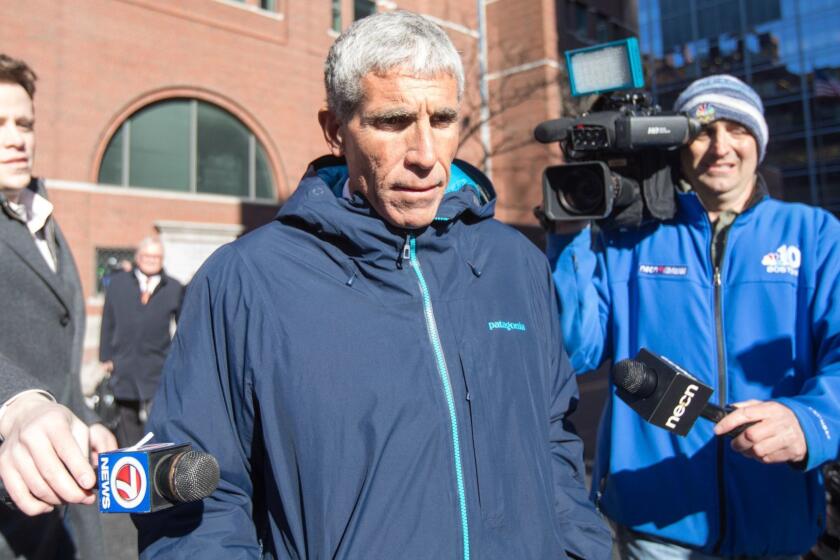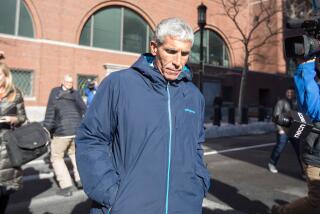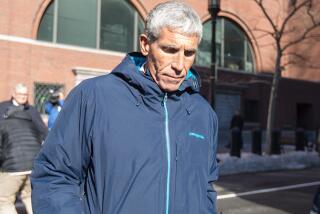Admissions scandal: After Rick Singer notes surface, ex-Pimco chief to appeal sentence

- Share via
Already ordered to spend nine months in prison for bribing his children’s way into USC and Georgetown, Douglas Hodge, the former chief executive of Pimco, plans to appeal his sentence in light of newly disclosed notes taken by the scam’s ringleader, William “Rick” Singer.
In an early sign those notes could roil the government’s case, Hodge’s attorney, Brien O’Connor, asked on Thursday to extend the 30-day window Hodge has to challenge his prison sentence, citing the government’s “inappropriate withholding” of notes Singer wrote in his iPhone while cooperating with federal agents.
Singer was calling dozens of his former clients on a recorded line, retreading deals they’d brokered to get their children into such elite schools as Georgetown, USC and UCLA. But Singer’s handlers, he wrote, were insisting he “tell a fib” and portray the payments that clinched their children’s admission as bribes, not donations, to university programs.
Hodge was sentenced Feb. 7. Nineteen days later, prosecutors disclosed Singer’s notes to attorneys for other parents charged in the case.
Eric S. Rosen, an assistant U.S. attorney, told the lawyers in a letter that a prosecutor first glimpsed one of the notes in October 2018. Because Singer had written the notes to his own lawyer, Rosen and his colleagues believed the writings were protected by attorney-client privilege, Rosen wrote. Singer’s lawyer waived that privilege last week and the notes were turned over.
Federal prosecutors accused top CEOs, two Hollywood actresses and others of taking part in an audacious scheme to get their children into elite universities through fraud, bribes and lies.
O’Connor said without those messages, U.S. District Judge Nathaniel M. Gorton had not viewed a “full and accurate record” of Hodge’s conduct before sentencing him to nine months in prison, the longest term handed down in the case to date. O’Connor declined to comment Thursday.
While he didn’t dispute his guilt and acknowledged committing fraud and money laundering, Hodge had argued he thought the money he paid to get four children into USC and Georgetown as bogus athletic recruits — $850,000 in all — was bound for school coffers, not the personal bank accounts of corrupt university employees. Singer, according to his own notes, appears to have imparted this impression on his clients, O’Connor wrote.
Hodge “takes full responsibility for his conduct,” O’Connor wrote. “But there is an important distinction when evaluating Mr. Hodge’s culpability between payments intended to benefit a university and payments intended to benefit a specific coach in his or her personal capacity.”
Despite his planned appeal, Hodge will report to prison by March 20 as ordered, O’Connor wrote. He has paid the $750,000 fine Gorton had imposed, O’Connor added.
The self-described “master coach” warned parents that in the scrabble for a spot at an elite university, their children would hardly stand out without his help.
Two other parents who have pleaded guilty to fraud and money laundering, Manuel and Elizabeth Henriquez, asked to delay their sentencing hearings after Singer’s notes were disclosed. The government is seeking sentences of 18 months and 26 months for the Atherton couple, respectively. Elizabeth Henriquez will be sentenced March 31; Manuel Henriquez, April 8.
In a letter dated Monday, Rosen told defense attorneys he was turning over a tranche of evidence they had squabbled over for months: FBI and Internal Revenue Service reports of interviews with Singer and USC employees, and extractions from the iPhone Singer used as a cooperating witness.
Rosen added that by March 13, he would furnish the attorneys with, among other records, the contents of Singer’s Google Drive, Singer’s handwritten notes, videos of other cooperating witnesses, the script Singer used while calling clients on a recorded line, and a recorded phone call between Singer and his government handlers.
After Singer’s notes were disclosed, Gorton, the judge, told defense attorneys they could file motions to dismiss the indictment against their clients, suppress evidence or seek sanctions for government misconduct. Gorton on Thursday extended the filing deadline to March 20.
More to Read
Sign up for Essential California
The most important California stories and recommendations in your inbox every morning.
You may occasionally receive promotional content from the Los Angeles Times.












